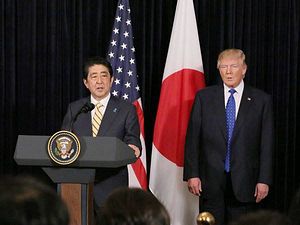On Wednesday, Japanese Prime Minister Shinzo Abe, reflecting on his state visit to the United States, remarked that U.S. President Donald J. Trump and he saw eye-to-eye on Japan’s monetary moves.
“I think Trump shared the view that our monetary policy is not for currency manipulation but for ending deflation,” Abe told the House of Councilors, the upper house of Japan’s bicameral parliament.
Trump, earlier this year, had included Japan in a tirade on alleged currency manipulation. “You look at what China’s doing, you look at what Japan has done over the years. They — they play the money market, they play the devaluation market and we sit there like a bunch of dummies,” he’d said, drawing a rebuke from the Japanese foreign ministry’s foreign exchange policy chief, Masatsugu Asakawa.
In April 2015, before he’d declared his campaign for the presidency, Trump accused Japan of “currency manipulation” in a tweet where he also criticized the Trans-Pacific Partnership.
The comment may have been motivated by political considerations on Abe’s part to keep appearances up after what was by most accounts a surprisingly successful first summit with Trump in office.
In Japan, the Abe-Trump meeting was largely seen positively, with 70 percent of respondents in one poll expressing satisfaction with the visit’s outcome.
Abe and Trump held summit discussions in Washington, D.C., on February 10. Thereafter, they traveled to Trump’s estate at Mar-a-Lago in Florida, where they continued talks and dealt with North Korea’s Sunday morning missile launch.
Despite Abe’s comments, last week’s summit laid down the foundation for future economic and trade talks between the two sides.
At a press conference in Washington, Abe expressed his support for high-standard multilateral trade deals in Asia, despite Trump’s criticism of and decision to withdraw the United States from the Trans-Pacific Partnership, a deal that Japan had strongly supported.
Neither side commented publicly on Japan’s monetary policy and bouts of direct foreign exchange intervention, which were opposed by previous U.S. administrations as well.
Abe’s eponymous ‘Abenomics’ set of monetary, fiscal, and structural reforms are geared toward restoring a healthy level of inflation in Japan.
The Bank of Japan has regularly intervened to weaken the yen in recent years — most notably in 2011, after the devastating Tohoku earthquake and tsunami.
More recently, the Bank of Japan, which has started experimenting with negative rates, has said that Japanese interventions do not target a desired exchange rate for the yen against the dollar, but focus on price stability instead.
Trump, along with some of his top advisers on trade, including Peter Navarro, the chief of a newly created U.S. National Trade Council, have criticized China and Germany recently for currency manipulation.
Despite these accusations, the People’s Bank of China has sought to strengthen the renminbi to stem capital flight. Navarro has argued that Germany, which similarly maintains a strong trade surplus, benefits from its membership in the eurozone.
Abe and Trump announced that Japanese Finance Minister Taro Aso and U.S. Vice President Michael Pence would convene talks on bilateral trade as the two countries eye a bilateral free-trade agreement in the aftermath of U.S. withdrawal from the TPP.
Given the U.S. administration’s seeming obsession with lowering trade deficits with exporting nations, Japan’s monetary practice may emerge as a flashpoint once again.
Despite the Japanese prime minister’s assurances to lawmakers in Tokyo, we haven’t heard Trump mention the topic since February 1, when he’d criticized Japan.
For now, however, Abe is cautiously optimistic that Trump understands the monetary demands of making ‘Abenomics’ work for Japan.

































